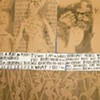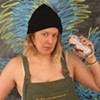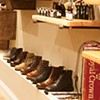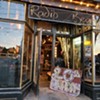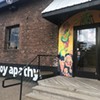click to enlarge 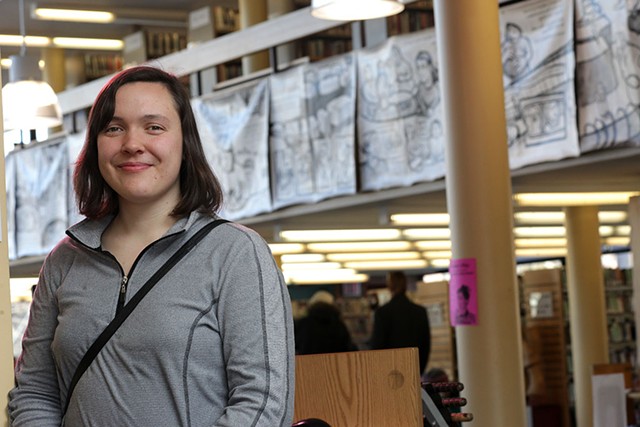
- Matthew Thorsen
- Michelle Sayles
Michelle Sayles and
Jen Berger expected some backlash about their “street comic.” The 45-foot-long, black-and-white banner titled “
Najawa: A Story of Palestine,” commissioned by
Vermonters for a Just Peace in Palestine/Israel, tells the story of a fictional Palestinian refugee. It was first exhibited at the
South End Art Hop last September and now hangs in Burlington’s
Fletcher Free Library.
“I was nervous,” Sayles said. “But when we put it out at Art Hop, people were saying, ‘Wow, this is really powerful.’” Berger, who contributed to the research and installation of the piece, says, “Historically, pieces like this aren’t well received. But I haven’t felt any backlash at all.”
Their concerns weren’t unwarranted. Berger was referring not just to political art in general but to the work
Bread and Puppet Theater founder Peter Schumann displayed at the Art Hop in 2007. “Independence Paintings: Inspired by Four Stories” compared the Israeli treatment of Palestinians to the Nazis' treatment of Jews during the Holocaust. The exhibit was met with
protestors at a VTJP event that weekend. *
As it happens, a donation from Bread and Puppet made “Najawa” possible. The funding enabled VTJP to cover the cost of Sayles’ paints, brushes and canvases. But, as VTJP member Marc Estrin makes clear, neither organization had creative control over the content of the comic. “VTJP said, we trust you as an artist, and whatever you come up with we’ll be happy to fund,” says Estrin.
click to enlarge 
- Matthew Thorsen
- "Najawa" at the Fletcher Free Library
“Najawa” offers a concise critique of Israel’s treatment of Palestinians, and in doing so opens the door to criticism from anyone who, for political or religious reasons, supports the actions of Israel.
But, Sayles says, “I didn’t want it to be divisive. I wanted it to be a chance for people to understand and have compassion for a side of the story that doesn’t often get told.”
After months of research into the origins of the Israeli-Palestinian conflict, she and Berger synthesized a story that they hoped would compel, rather than rile, their audience.
It begins with the fictional Najawa’s birth in 1948, the year the United Nations created the State of Israel. The first panel describes the results of that action: “750,000 Palestinians were displaced from their homes. My family was one of them.” That exodus is known among Palestinians as the Nakba.
The remaining panels follow Najawa as she navigates childhood as a refugee, and then, in her twenties, joins Palestinian resistance efforts. “I was reading a lot of Tawfiq Ziad’s poetry,” the third reads, referring to the Palestinian politician and poet. As the story continues, Najawa deals with Israeli military governance, her children’s fears that “army men will raid our house,” and her daughter’s doubts that peace will ever come.
click to enlarge 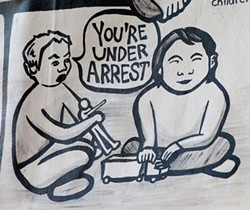
- Matthew Thorsen
- From "Najawa"
Wafic Faour, a Palestinian American and VTJP member, remembers being moved by “Najawa” when he saw it at the Art Hop “because of its simplicity, its powerful message through a woman’s point of view.” Faour was born in 1960 in a refugee camp in Lebanon.
“It scratched memory for me,” he says of the comic, because of its female perspective. “My mother told me what was Palestine, where we originally belonged. She is the one who kept the hope going, that where she came from is better than the way we live. Always the food, the olive oil, is much better in Palestine,” Faour continues. “Through that memory, she’s building a relationship between myself, her child, and the home I had never seen.”
A scene from Tahani Rached’s 2004 documentary
Soraida, a Woman of Palestine, inspired the final panel. It depicts a vision of the future: the Israeli government’s West Bank wall being torn apart. Najawa stands before the crumbling wall, looking up at a sky full of birds.
“Sometimes I look up and I envy the birds who know nothing of checkpoints and walls,” the panel reads. “I imagine them flying down and delivering our freedom like bits of sky.”
Sayles says she sees this panel as “a vision of what could be. It’s a metaphor of what could be accomplished.”
“
Najawa: A Story of Palestine” is on view through March 1 at the Fletcher Free Library in Burlington. It is also available as a free downloadable zine
here.
*Updated April 5, 2016: This post has been corrected to accurately describe a protest event.








































